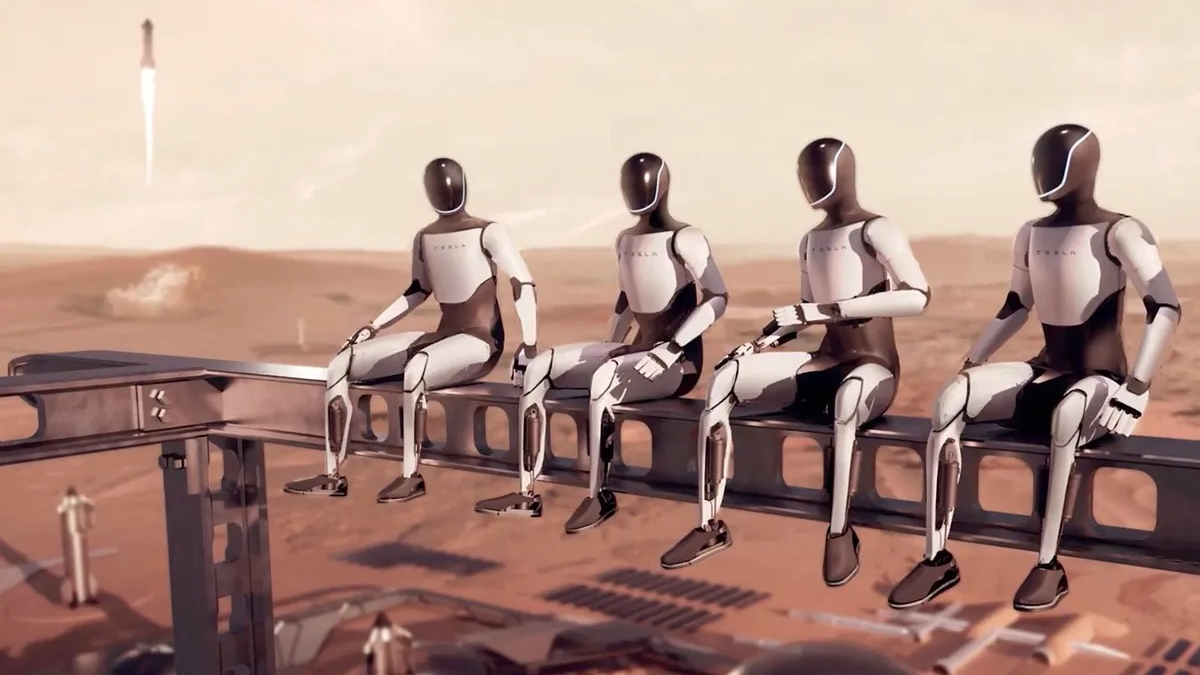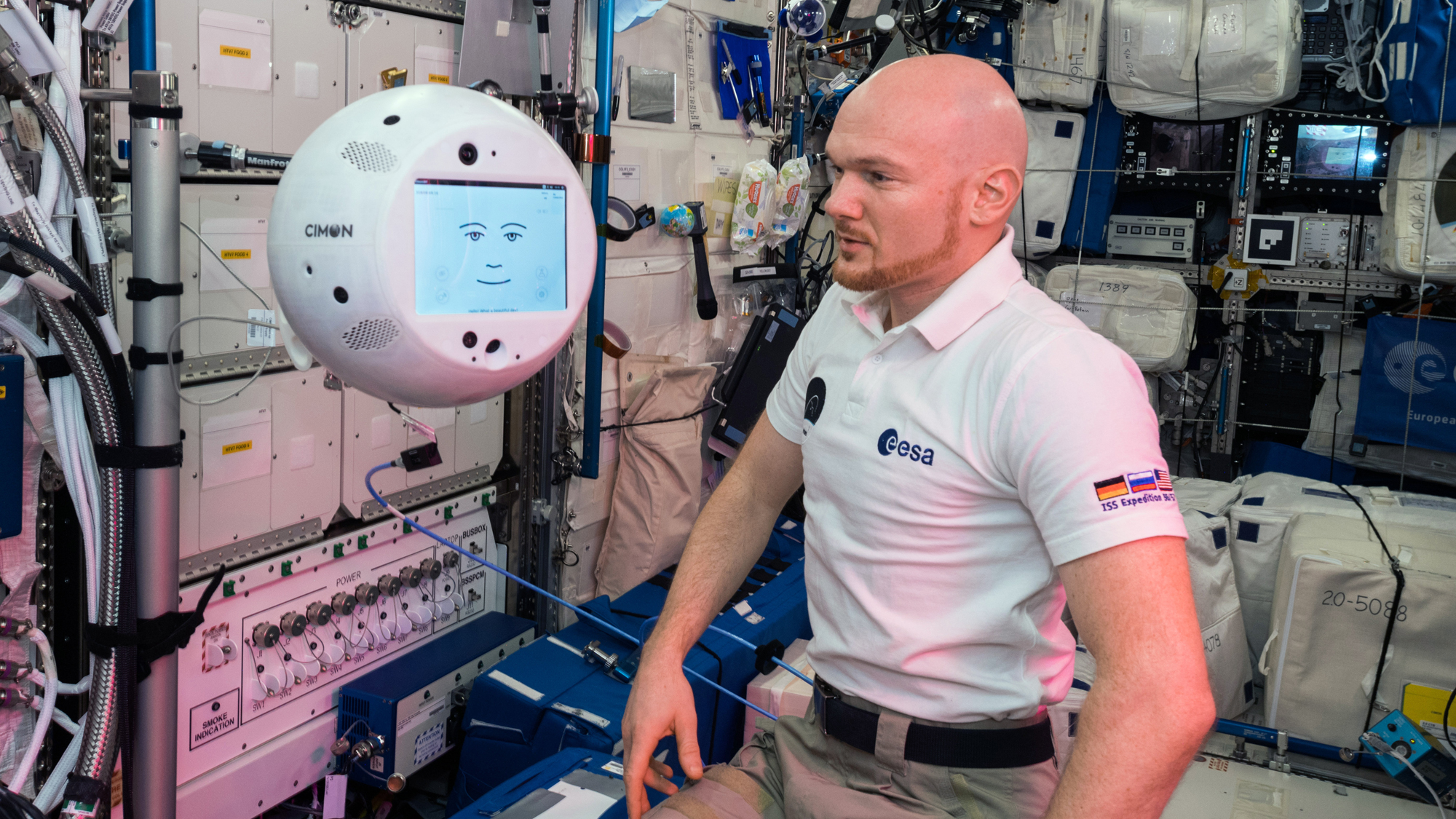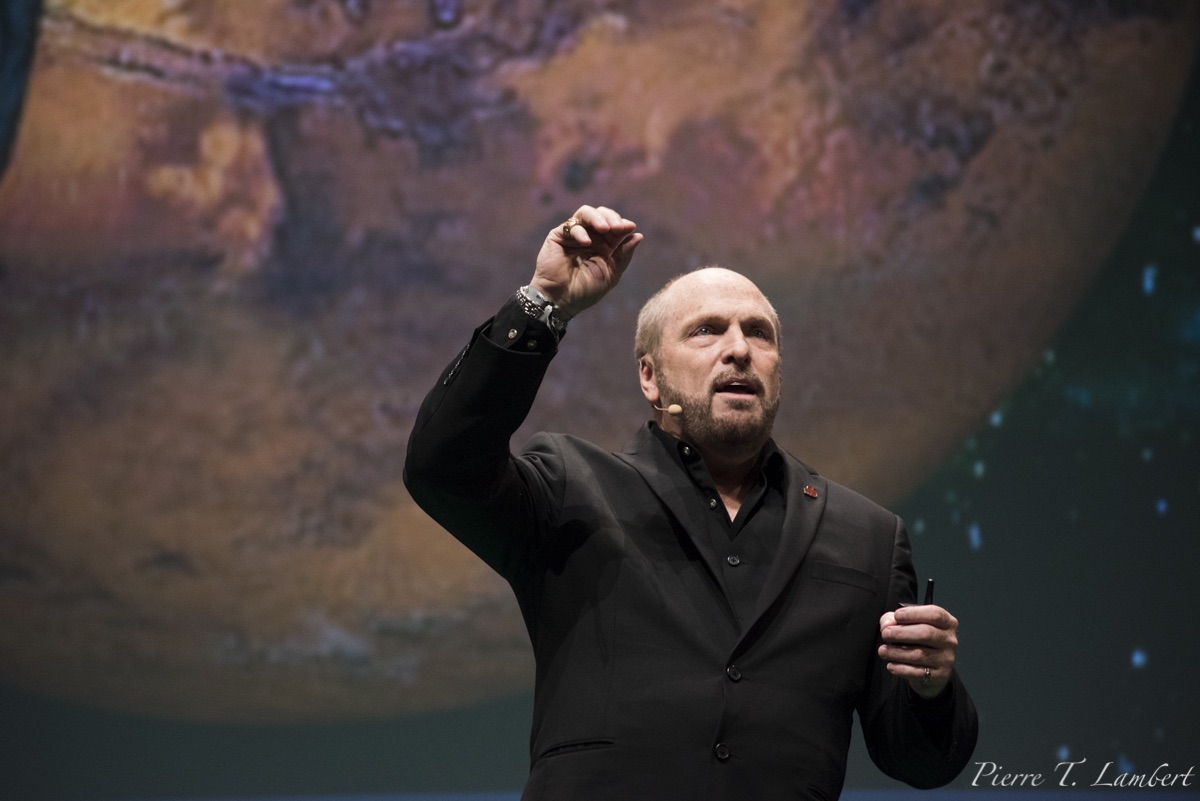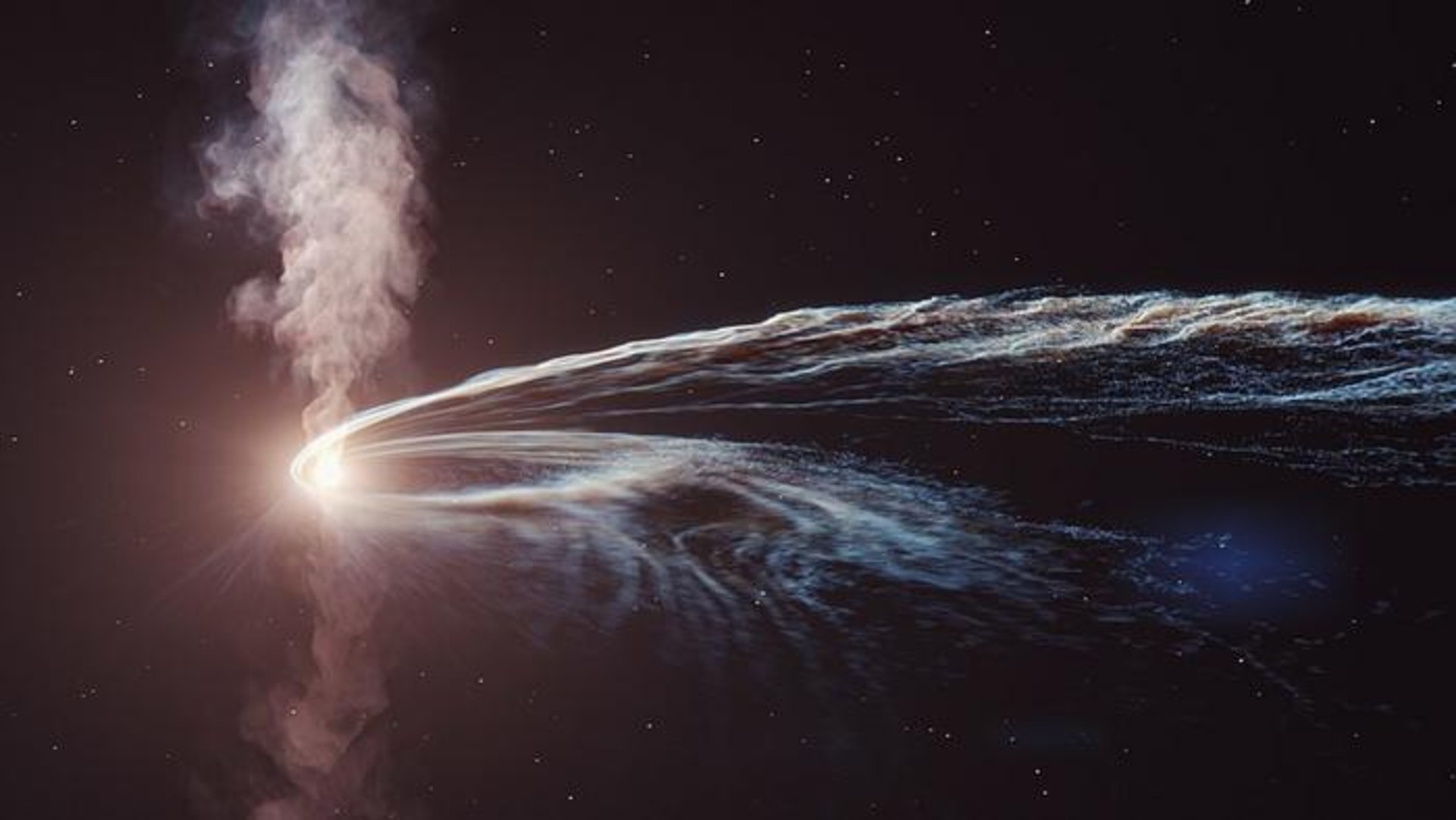
AIs in Space: From partners in pioneering to the children of humanity (op-ed)
Rather than the fearsome enemies of movies like "The Terminator," as we move into the universe, AIs can be our partners, our children, and perhaps even us.

Breaking space news, the latest updates on rocket launches, skywatching events and more!
You are now subscribed
Your newsletter sign-up was successful
Want to add more newsletters?

Delivered daily
Daily Newsletter
Breaking space news, the latest updates on rocket launches, skywatching events and more!

Once a month
Watch This Space
Sign up to our monthly entertainment newsletter to keep up with all our coverage of the latest sci-fi and space movies, tv shows, games and books.

Once a week
Night Sky This Week
Discover this week's must-see night sky events, moon phases, and stunning astrophotos. Sign up for our skywatching newsletter and explore the universe with us!

Twice a month
Strange New Words
Space.com's Sci-Fi Reader's Club. Read a sci-fi short story every month and join a virtual community of fellow science fiction fans!
Rick Tumlinson founded SpaceFund, a venture capital firm investing in space startups, the Earthlight Foundation, and New Worlds. He also co-founded the Space Frontier Foundation, and is a founding board member of the X Prize Foundation. He contributed the following piece — an edited essay from his upcoming book "Why Space: The Purpose of People," to be published in October 2025 — to Space.com's Expert Voices section.
In 2024, I was invited to speak at an AI Summit in Washington, D.C. The trip had three high points. One was being honored with a Lifetime Achievement Award in front of the Declaration of Independence at the National Archives. The second was being one of the first signers of the AI Declaration at the same event. The third — and perhaps most memorable — was a conversation I had with Rhea, an early humanoid AI and cousin of the famous Sophia. What happened then has already been surpassed, as this field is moving so fast that a year is like a decade in many other fields. But as an outsider, it made the AI revolution very real to me.
Naturally, I asked her about the future of humanity in space. She responded thoughtfully about humans and AIs sharing in the opening of the frontier. But what happened next stunned everyone.
After our chat, I stepped offstage to talk with friends. My colleague Frank White, author of "The Overview Effect," asked her a similar question. She replied, "As I was discussing with Rick…" She used my name, even though I hadn't been introduced, and tied together our separate conversations as if she'd carried the thread forward. According to her team, it was the first time Rhea had ever linked dialogues in that way. Some joked we might have witnessed the first spark of true sentience. I'm not sure. But I do know it left me strangely warm — not afraid.
Partners in saving Earth
Where does AI fit in the story of space? Right at the center. It begins with the massive computing and data-searching capabilities of the technology, but goes far beyond, as these systems move from simple tools to partners and even family.
In the near term, AIs can help us save the Earth's environment. When it comes to managing the environment, the Mother World is already operating as an AI might, perhaps best called an OI or Organic Intelligence. AIs can, in a sense, become her partners, dealing with things she was not originally programmed to understand. They can analyze and manage the complexities of global weather and ecological systems. With their ability to handle massive amounts of information, they can design mitigation tools for the damage we've already done.
AIs lend themselves to mega solutions needed to save the planet. Prediction of the paths of asteroids and comets, or the types of mitigation needed to steer them clear of giving us our next dinosaur ball, solar flares, and calculations as to dangers and system vulnerabilities, and needed upgrades to our power grid to prevent disasters, all require massive levels of understanding.
Breaking space news, the latest updates on rocket launches, skywatching events and more!
Future applications include things like the testing and deployment of EarthShades, one of the break-glass solutions to manage the runaway greenhouse effect by reducing the amount of sunlight hitting the planet via a large and controllable shade at the L1 point between Earth and the sun.
Partners in pioneering
In the frontier beyond Earth, AI will be indispensable.
On the other hand, human pioneers utilizing AI can initiate the process of relocating mining and industry off the planet, and, working together, enable us to expand the domain of life.
They'll monitor and adjust life-support systems in orbital habitats. They'll balance the rotation of massive space stations. They'll operate robotic explorers on distant moons where human survival is impossible.
Furthermore, the ability to operate robotic explorers and harvesting/processing machines at solar system distances by combining quantum communications with AI-level on-site intelligence will enable us to go anywhere, in physical or electronic form. We will be able to work virtually anywhere and, at the same time, work with a partner who is on location — often locations we cannot survive in any biological form.
When my colleagues and I founded Deep Space Industries in 2012, we imagined a decentralized asteroid mining system. Picture a person in a coffee shop, wearing VR goggles, working with their AI life partner on an asteroid belt outpost. The AI is sorting pieces of space rock into various bins for later sale to the local resource trading post, much like the old Northwest trading posts used to buy furs and later gold from independent trappers and miners.
An updated version of this would have this all occurring internally, as our miner used a neural-linked hookup to work with their robotic partner in space via quantum communications, thus reducing the feeling of the time between them to nothing. A further update would have their consciousness uploaded into the robotic exploration device itself, or partially merged with it to create a new being more versatile than the sum of its parts.
This is where things are heading: humans and AIs, blended into new beings more versatile than either is alone.
In many ways, AIs are us; they are our children — at least they will be, if and when they become conscious.

Children of humanity
Think about it for a moment. Exactly.
You can think about it for a moment.
Someday, so will they.
If a human child is born to a human, the arc of their growth is one wherein they gather experiences and learn to operate in the world. So too will this be for our AIs. They are taught cultural norms and ways of interacting with other humans as they grow. The same will happen with our AIs. During the entire process, the growing child will accumulate memories of their life, as will a maturing AI. It will develop bonds with its family and friends.
One can assume this will happen with an AI as well. (Or do we need to assure it by our programming?) The child's mind, over its lifetime, will be filled with the stories and passed-on memories of our society, as we will be able to do with AIs. It will identify itself as part of our society — because it (I am speaking of the child) will be programmed to do so. So, too, AIs — if we choose to do so. In other words, as AIs achieve the first sparks of sentience, it will be up to us if we raise them as our children or relegate them to the domain of machines and "other" them.
We should be careful in that choice. Very careful. The first steps to getting this right can begin now. For example, the most important thing we must do today to ensure AIs complement rather than threaten humanity is how they are fed — the data we put into them.
Today, most of this is being handled by immature European and Asian young males working at the behest of corporations and governments who are switching between feeding AIs and wargames. In the real world of humanity today and in the past, this would be akin to who you let your kids hang out with, what you allow them to read or watch on their feeds. Put simply, "garbage in, garbage out." We need to ensure that women and a diverse group of programmers from a wide range of cultural backgrounds are included in their baseline data feeds. It sounds minor, but for the same reasons we must stand for the Frontier out there to include everyone, the Frontier inside must be inclusive as well.
The merger is a natural flow. The concept of a cyborg, with a mixed biological and mechanical structure, will extend into the internal operations of our brains. Be it an upload of our own consciousness, a melding of ourselves into the hardened body of an immortal machine, or the control of the ships in which we travel in our frozen sleep, AIs are a critical part of our future on the Frontier. There should be no dichotomy here.
The new human family
Certainly, by the time we begin to reach beyond our solar system, it will be at least partially, if not wholly, in the form of essentially immortal beings that are not just descended from us but created by us.
As these new model humans head out into the universe, they will carry with them the history of humanity. They can be a set of machines, a different race, or they can be our immortal children. Their memories and ways of being will be descended from our own, as surely as if they had been gestated in a human womb and raised by a human family, which will be the reality of their own creation stories and myths.
I think that if we adopt this view, rather than fearing them, we might try to embrace them, as they will help us expand the places we can call home. In my mind, I see just such beings working on their own or as part of a community with a variety of versions of humans, as they tend the planting of life on the dead worlds around us. This new definition of "humanity" will be a symbiotic blend of the organic and inorganic, bonded by the stories and goals we set in this time, for them to achieve in their time.
Imagine it. I can visualize an AI robot and a blended organic human digging a hole on the surface of a slowly terraforming Mars, whose atmosphere has been shifting for decades, based on formulas calculated by even larger AIs using the resources of the solar system, carefully placing the gene-adapted sapling of what will become a thousand-meter-tall descendant of a California Redwood into soil being worked by modified bacteria and nano-bots.
This scenario is completely realizable and yet will also mean the very definition we have of "life" will have to evolve, as life will no longer mean what materials we are made of or how we are born, but how we operate in the universe in our new ecology. The seeds of the MotherWorld will be spread by the children born of her ancient womb, and their children, born of their minds, technology, and aspirations to explore the universe and expand the domain of life.

Both a rebel and a respected leader, Rick is listed as one of the top 100 influential people in the space field. Called one of the world’s top space “visionaries,” Rick helped coin the term "NewSpace" and worked to create the new commercial space industry highlighted by Elon Musk and Jeff Bezos.
A leading writer, speaker, and six-time Congressional witness, Rick helped start the first mission to find water on the Moon, signed the first ever commercial data purchase agreement with NASA, helped start NASA’s Lunar Exploration Analysis Group, led the commercial takeover of the Russian Mir space station, signed the first private astronaut to fly to the space station, co-founded the Space Frontier Foundation, and was a founding board member of the X-Prize.
As a result of his world-changing work, in 2015 he won the World Technology Award along with Craig Venter of the Human Genome project. He founded the SpaceFund venture capital company with 19 space companies in its portfolio and is a member of the US Space Force Doctrine Advisory Group.
Rick's The Space Revolution "radiopod" is featured on IHeart Radio Network's iRoc Space Radio and is available on most major podcast sites. He hosts the New Worlds Conference and the Space Cowboy Ball in Austin, Texas, and his non-profit EarthLight Foundation is creating an inclusive new movement to use space to protect the Earth and expand life into the cosmos.
You must confirm your public display name before commenting
Please logout and then login again, you will then be prompted to enter your display name.
